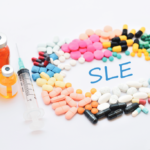All patients were 18 years old or older, with at least moderately active, autoantibody-positive SLE, and were on standard therapy prior to randomization. Patients were excluded if they had received other investigational agents within the previous three months or if they had received belimumab, rituximab, ocrelizumab or other B cell-directed biologic therapies within one year of the study.
The primary outcome measure was the SLE Responder Index 4 (SRI-4) at Week 24 compared with the screening visit in the intent-to-treat (ITT) population (n=306). Secondary outcomes included reduction in corticosteroid dose and the patient’s global assessment of change at 24 weeks. The study also explored SRI-4 in subgroups of patients.
Efficacy: In the ITT population, the study found no statistically significant differences in SRI-4 between the treatment groups and placebo, although a trend in improved SRI-4 response rate was seen with atacicept at both doses. At 24 weeks, the SRI-4 response rate was 57.8% (adjusted odds ratio [OR] of 1.78 [95% CI 1.01-3.12]) for patients treated with atacicept 75 mg and 53.8% (OR of 1.56 [95% CI 0.89-2.72]) for those treated with atacicept 150 mg versus 44% for placebo (P=0.121).
Looking at secondary outcomes, the study also did not find any significant differences between atacicept at 75 mg or 150 mg and placebo in the proportion of patients achieving a reduction in corticosteroid dosage. In patients taking corticosteroid dosage of >10 mg/day at screening (baseline), 17.9% and 11.3% of patients treated with atacicept at 75 mg and 150 mg, respectively, had a dose reduction of <76.5 mg/day at 24 weeks compared with 18.9% of placebo patients.
In addition, no significant differences were noted between the treatment and placebo groups in changes in the patients’ global assessment at 24 weeks.
The study did find more patients in the ITT group receiving atacicept at either dose achieved an SRI-4 response compared with placebo (P<0.05 for each treatment dosage to placebo) based on a prespecified sensitivity analysis in which investigators looked at SRI-4 response at 24 weeks compared with the first day of the study as the baseline instead of the screening visit.
Safety: Atacicept was shown to be safe and well tolerated in the study. Treatment-emergent adverse events (TEAEs) with atacicept at 75 mg and 150 mg were seen in 81.4% and 80.8% of patients (vs. 72.0% in the placebo group). Among the TEAEs reported were upper respiratory tract infections and diarrhea (more common in the atacicept groups) and urinary tract infections (slightly more common in the placebo group).

